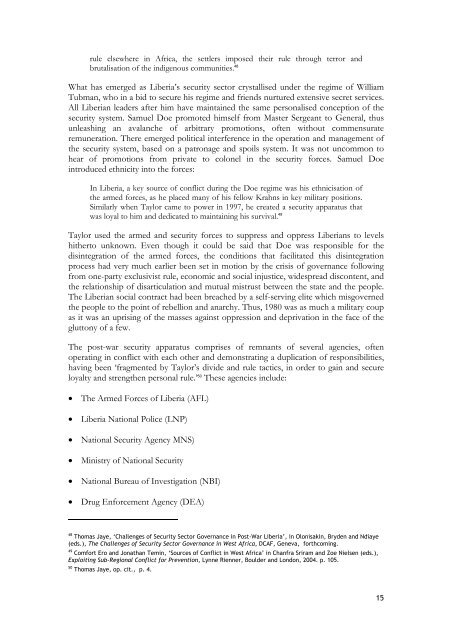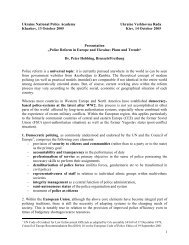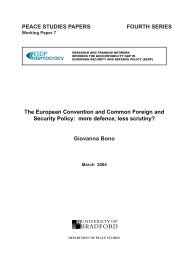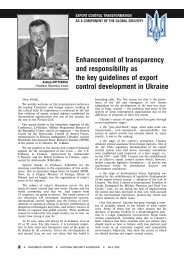The Challenges and Opportunities of Security Sector Reform in Post ...
The Challenges and Opportunities of Security Sector Reform in Post ...
The Challenges and Opportunities of Security Sector Reform in Post ...
You also want an ePaper? Increase the reach of your titles
YUMPU automatically turns print PDFs into web optimized ePapers that Google loves.
ule elsewhere <strong>in</strong> Africa, the settlers imposed their rule through terror <strong>and</strong><br />
brutalisation <strong>of</strong> the <strong>in</strong>digenous communities. 48<br />
What has emerged as Liberia’s security sector crystallised under the regime <strong>of</strong> William<br />
Tubman, who <strong>in</strong> a bid to secure his regime <strong>and</strong> friends nurtured extensive secret services.<br />
All Liberian leaders after him have ma<strong>in</strong>ta<strong>in</strong>ed the same personalised conception <strong>of</strong> the<br />
security system. Samuel Doe promoted himself from Master Sergeant to General, thus<br />
unleash<strong>in</strong>g an avalanche <strong>of</strong> arbitrary promotions, <strong>of</strong>ten without commensurate<br />
remuneration. <strong>The</strong>re emerged political <strong>in</strong>terference <strong>in</strong> the operation <strong>and</strong> management <strong>of</strong><br />
the security system, based on a patronage <strong>and</strong> spoils system. It was not uncommon to<br />
hear <strong>of</strong> promotions from private to colonel <strong>in</strong> the security forces. Samuel Doe<br />
<strong>in</strong>troduced ethnicity <strong>in</strong>to the forces:<br />
In Liberia, a key source <strong>of</strong> conflict dur<strong>in</strong>g the Doe regime was his ethnicisation <strong>of</strong><br />
the armed forces, as he placed many <strong>of</strong> his fellow Krahns <strong>in</strong> key military positions.<br />
Similarly when Taylor came to power <strong>in</strong> 1997, he created a security apparatus that<br />
was loyal to him <strong>and</strong> dedicated to ma<strong>in</strong>ta<strong>in</strong><strong>in</strong>g his survival. 49<br />
Taylor used the armed <strong>and</strong> security forces to suppress <strong>and</strong> oppress Liberians to levels<br />
hitherto unknown. Even though it could be said that Doe was responsible for the<br />
dis<strong>in</strong>tegration <strong>of</strong> the armed forces, the conditions that facilitated this dis<strong>in</strong>tegration<br />
process had very much earlier been set <strong>in</strong> motion by the crisis <strong>of</strong> governance follow<strong>in</strong>g<br />
from one-party exclusivist rule, economic <strong>and</strong> social <strong>in</strong>justice, widespread discontent, <strong>and</strong><br />
the relationship <strong>of</strong> disarticulation <strong>and</strong> mutual mistrust between the state <strong>and</strong> the people.<br />
<strong>The</strong> Liberian social contract had been breached by a self-serv<strong>in</strong>g elite which misgoverned<br />
the people to the po<strong>in</strong>t <strong>of</strong> rebellion <strong>and</strong> anarchy. Thus, 1980 was as much a military coup<br />
as it was an upris<strong>in</strong>g <strong>of</strong> the masses aga<strong>in</strong>st oppression <strong>and</strong> deprivation <strong>in</strong> the face <strong>of</strong> the<br />
gluttony <strong>of</strong> a few.<br />
<strong>The</strong> post-war security apparatus comprises <strong>of</strong> remnants <strong>of</strong> several agencies, <strong>of</strong>ten<br />
operat<strong>in</strong>g <strong>in</strong> conflict with each other <strong>and</strong> demonstrat<strong>in</strong>g a duplication <strong>of</strong> responsibilities,<br />
hav<strong>in</strong>g been ‘fragmented by Taylor’s divide <strong>and</strong> rule tactics, <strong>in</strong> order to ga<strong>in</strong> <strong>and</strong> secure<br />
loyalty <strong>and</strong> strengthen personal rule.’ 50 <strong>The</strong>se agencies <strong>in</strong>clude:<br />
• <strong>The</strong> Armed Forces <strong>of</strong> Liberia (AFL)<br />
• Liberia National Police (LNP)<br />
• National <strong>Security</strong> Agency MNS)<br />
• M<strong>in</strong>istry <strong>of</strong> National <strong>Security</strong><br />
• National Bureau <strong>of</strong> Investigation (NBI)<br />
• Drug Enforcement Agency (DEA)<br />
48 Thomas Jaye, ‘<strong>Challenges</strong> <strong>of</strong> <strong>Security</strong> <strong>Sector</strong> Governance <strong>in</strong> <strong>Post</strong>-War Liberia’, <strong>in</strong> Olonisak<strong>in</strong>, Bryden <strong>and</strong> Ndiaye<br />
(eds.), <strong>The</strong> <strong>Challenges</strong> <strong>of</strong> <strong>Security</strong> <strong>Sector</strong> Governance <strong>in</strong> West Africa, DCAF, Geneva, forthcom<strong>in</strong>g.<br />
49 Comfort Ero <strong>and</strong> Jonathan Tem<strong>in</strong>, ‘Sources <strong>of</strong> Conflict <strong>in</strong> West Africa’ <strong>in</strong> Chanfra Sriram <strong>and</strong> Zoe Nielsen (eds.),<br />
Exploit<strong>in</strong>g Sub-Regional Conflict for Prevention, Lynne Rienner, Boulder <strong>and</strong> London, 2004. p. 105.<br />
50 Thomas Jaye, op. cit., p. 4.<br />
15

















